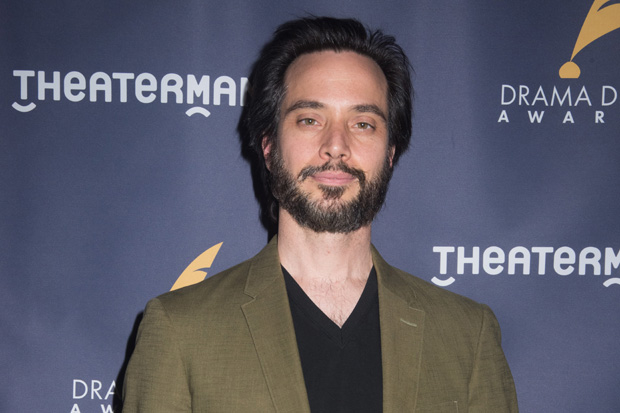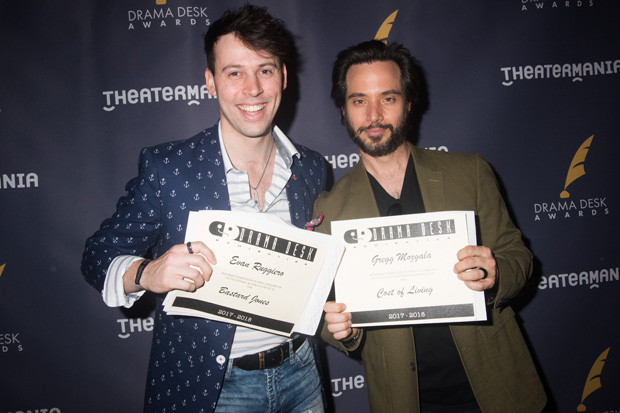Gregg Mozgala Is the Hardest-Working Actor in New York
Drama Desk-nominated for ”Cost of Living” and currently starring in ”Light Shining in Buckinghamshire”, he just went into rehearsals for ”Teenage Dick”.

(© Monica Simoes)
Gregg Mozgala is the kind of actor you see once and never forget. I first saw him in the New York debut of Martyna Majok's Cost of Living at Manhattan Theatre Club (which won the 2018 Pulitzer Prize for Drama). He played John, a wheelchair-bound Princeton PhD candidate with cerebral palsy. Mozgala also has CP (though he doesn't use a wheelchair) and was able to bring a level of authenticity and physical commitment to the role that a nondisabled actor never could. It left enough of an impression that Mozgala was nominated for Drama Desk, Outer Critics, and Lortel Awards — a rare trifecta for a performance that ended last July. He won the Lortel, lost the Outer Critics (to Andrew Garfield), and the jury's still out on the Drama Desk.
Mozgala is enjoying the recognition, but he's already moved on to his next two projects: He's currently starring in the revival of Caryl Churchill's Light Shining in Buckinghamshire at New York Theatre Workshop while attending rehearsals for a new play by Mike Lew called Teenage Dick. In it, Mozgala plays a 16-year-old Richard III scheming his way to victory in the class election. The play was developed by Mozgala's theater company, the Apothetae, and is being presented by Ma-Yi Theater Company. Performances begin June 12 at the Public Theater.
Mozgala took a rare break in his schedule to talk about his incredible year, his upcoming work, and his determination to create theater that breaks through tropes about the disabled experience.
Were you surprised that so many awards nominators remembered a performance that you gave last summer?
It's an incredible honor and very flattering. Martyna's play has been a real gift to me as an actor. I've been with it since the beginning and had been working on it for four years. It's a wonderful narrative about the disabled experience, and I'm happy to see that elevated more than anything else.
You were in the middle of a performance of Light Shining in Buckinghamshire when you won the Lortel Award. What was that like?
The assistant stage manager, Kristi Hess, pulled me aside and told me that I won at intermission. I was sorry to have missed the ceremony, but I can't think of a better reason to have missed it than to be working off-Broadway. Work is always the main goal for me.
Was the role of Richard in Teenage Dick written for you?
I commissioned the piece, actually. I started my company, the Apothetae, in 2012. Mike Lew was the fifth writer I approached to write a new play for the company. He's sharp and snappy, so I thought he would be a good fit for this adaptation. I'm fascinated with Richard III as an archetype, but teenagers are still figuring out who they are. Mike has done a beautiful job translating that story into a modern parlance.
Could you explain for the Hellenically challenged where the name "Apothetae" comes from?
There was a disabled playwright named John Belluso who passed away in 2006. I was in the New York premiere of his play, The Rules of Charity, in 2007. There's a character in the play who mentions the Apothetae, which was a chasm in Sparta where they would leave infants that didn't fit the Spartan physical ideal, including disabled infants, to be exposed to the elements. It roughly translates to "the place of exposure." I love the double entendre of exposure and shedding light on history that people may not know about. It's an homage to the history of disabled people and to John, who was a mentor for me.

(© Monica Simoes)
It seems like most disabled stories are meant to be inspirational or about overcoming adversity.
Or death with dignity! Those three narratives are pervasive. They're so entrenched in our popular cultural consciousness that I'm trying to present something else.
It would be hard to argue that Richard III is a feel-good, inspirational story. What drew you to the story of a villain?
Richard III is a villain. When we meet him in Shakespeare, he's an adult politician and killer. But the Richard of Teenage Dick is a 16-year-old kid. He doesn't start the villain, but we see him become the villain through circumstance and his refusal to accept himself in the world.
There's a scene that takes place in a dance studio where Richard laments "the wall-length mirrors where there's no place to hide the gracelessness with which I shamble about." You were in a dance piece, Diagnosis of a Faun, in 2009. Was dance a source of anxiety before that?
Oh, of course. Just seeing my reflection is a source of anxiety to this day. That doesn't go away. I forget that I'm disabled and then I catch my gait in the mirror, or someone looks at me and I know what they're clocking — and it immediately puts me back in that adolescent place. The way CP manifests with me is neurological. I know I should move with flowing grace and ease, but there's a system in my brain that makes me walk the way I walk. Dancing is nonhabitual for me, so it's actually easier for me to dance than to walk. Working with Tamar Rogoff on Diagnosis of a Faun completely changed my life. Tamar broke down the mechanical act of ambulation for me. The way I navigate the world has completely changed since then and that all happened because of dance. It sounds crazy, but art literally changed my life.
You've spoken about the adolescent anxiety of people noticing your walk, but you've chosen a career where your walk will be visible to thousands of strangers in the theater. Is that discomfort important for you as an actor?
Anne Bogart talks a lot about actors finding creativity in being off-balance. I'm off-balance as a person all the time! So it's not just about trusting that, but bringing my whole humanity and experience to the stage. With disability, there's a lot of disassociation in the interest of survival. The disability becomes an external aspect of your life. But really, it is an essential part of my humanity. This is the body with which I process all emotions and move through the world. I should be bringing that to the stage, warts and all. I've been really fortunate to have work opportunities to practice that. And it's going to be a practice for the rest of my life.










